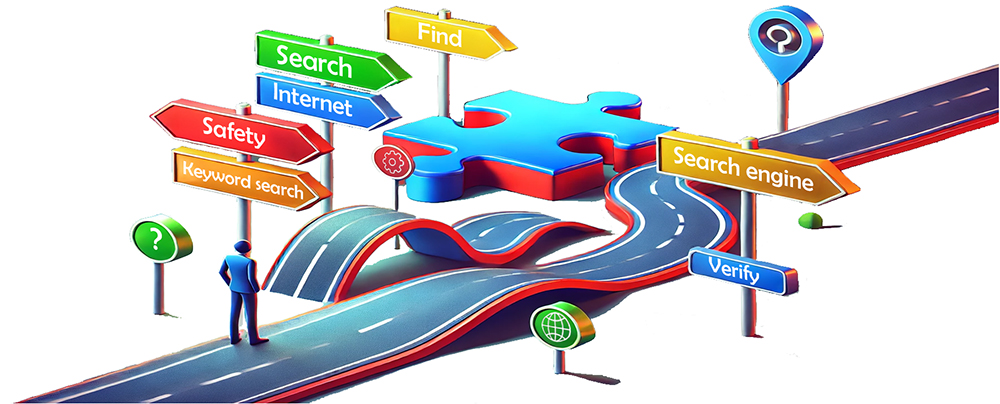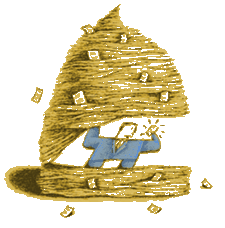
Illustrated by: CJ Kazilek
The Greatest Paper Ever Written?
Another long day in class is almost over. Thank goodness. At least there will be no homework tonight.
Wait! The teacher is saying something. Oh noooooo! She is saying those dreaded words… "Your assignment is to write at least five pages on... The paper is due on…."
You miss some of the details. No problem. This will be an easy assignment now that you have access to a computer and the Web. No worries. The assignment is quickly forgotten except for the few words scribbled in your class notebook.

Fast forward to the night before the paper is due. Your computer is on. You click off a game program and open the "all knowing" World-wide-web. This is going to be a snap.
You open a search engine. Click. Inside the search box you type a word or two about the paper's topic. You tap the enter key with confidence. A moment passes. Onto the screen pops one of 40 pages that include 10,000 possible websites. You are filled with a feeling of absolute power. This will be the greatest (and easiest) paper ever written.
Click. You select the first link. It turns out to be a product name for some company in New Zealand. Click. The second link turns up another dead end. Click. Click. Click… So do the next 10 links. A hard knot begins to form in the pit of your stomach.
Time to try another search engine. Don't panic yet.
Oh no! It comes up with the same or similar websites. A glance at the clock on the wall only increases your heart rate. You mutter something about "never again waiting until the last minute."
Get Your Search On

Searching for things on the Web can be like hunting for a needle in a large haystack. Just how large is the Internet? When this article was first written in 2001, there were over 29 million websites. In 2006, just 5 years later, there were over 85 million sites. This means in 5 years the number of sites almost tripled.
Well that tells us about Web sites, but what about different Web pages? Some sites have thousands of pages. In 2005, the number of pages per Web site was estimated to be 273. So if we apply that number to the sites in 2006, how many total webpages do we get?
85 million = 85,000,000
85,000,000 x 273 = 23,205,000,000 That is a big number, over 23 billion. So in 2006, there were likely over 23 billion different Web pages. In 2008, the search engine company Google announced that they had discovered one trillion unique URLs.
Let's go back to looking at Web sites again. After 2006, growth steadily continued. In 2014, there were a reported 968 million Web sites. If we use multiplication again and assume that there are still an average of 273 pages per site, how many Web pages would there have been in 2014?
968,000,000 x 273 = 264,264,000,000. That's over 264 BILLION Web pages.
With all that information, you might think it would be easy to write a great paper. However, the Web is just like any tool, it takes skill to get the best results. This is particularly true for science topics. If you want to write that great paper, you need to learn to use good searching skills. If you don't know these skills then you might as well start looking for that needle in the haystack.
Internet Research Skills
Anyone who has used the Web knows it can be a great place to find information. Searching for the information can also be frustrating and a waste of valuable time. Before we blame the Web or the search engines, let's get to the root of the problem. How do you find the information you need in that very large haystack of web pages? The answer is to learn some of the methods that will shorten your search. Here is a summary of tips and suggestions to help make your Web searches more productive. All of the tips will help you locate and evaluate information. Some of them will also make those science topic searches easier.
The Internet Trap

Using the Web to do research for a class assignment can be a good experience. It can also turn into a nightmare. Carpenters must learn how to use their hammer and chisels. Plumbers learn how to use their wrenches. The Web is also a tool. Learn how to use it and avoid the Web search trap. Just select a topic from the gold box on the right to learn more about finding what you need on the Web.
References:
Internet Live Stats: "Total number of websites." Retrieved December 10, 2015 from http://www.internetlivestats.com/total-number-of-websites/
Boutell.com "WWW FAQs: How many websites are there?" Retrieved April 28, 2010 from http://www.boutell.com/newfaq/misc/sizeofweb.html
Read more about: How to Find What You Need on the Internet
Bibliographic details:
- Article: How to Find What You Need on the Internet
- Author(s): CJ Kazilek
- Publisher: Arizona State University School of Life Sciences Ask A Biologist
- Site name: ASU - Ask A Biologist
- Date published: 27 Sep, 2009
- Date accessed: 22 September, 2025
- Link: https://askabiologist.asu.edu/explore/how-find-what-you-need-internet
APA Style
CJ Kazilek. (Sun, 09/27/2009 - 12:59). How to Find What You Need on the Internet. ASU - Ask A Biologist. Retrieved from https://askabiologist.asu.edu/explore/how-find-what-you-need-internet
Chicago Manual of Style
CJ Kazilek. "How to Find What You Need on the Internet". ASU - Ask A Biologist. 27 Sep 2009. https://askabiologist.asu.edu/explore/how-find-what-you-need-internet
MLA 2017 Style
CJ Kazilek. "How to Find What You Need on the Internet". ASU - Ask A Biologist. 27 Sep 2009. ASU - Ask A Biologist, Web. https://askabiologist.asu.edu/explore/how-find-what-you-need-internet
Be Part of
Ask A Biologist
By volunteering, or simply sending us feedback on the site. Scientists, teachers, writers, illustrators, and translators are all important to the program. If you are interested in helping with the website we have a Volunteers page to get the process started.




